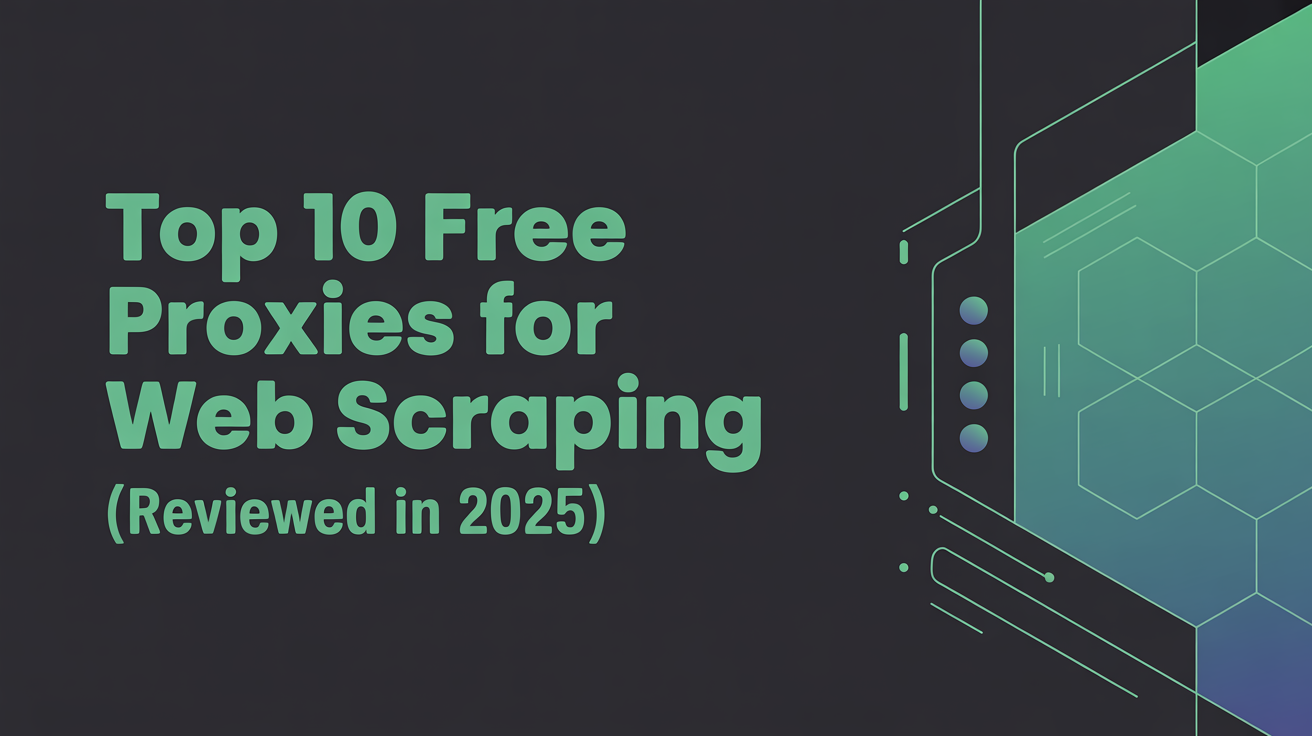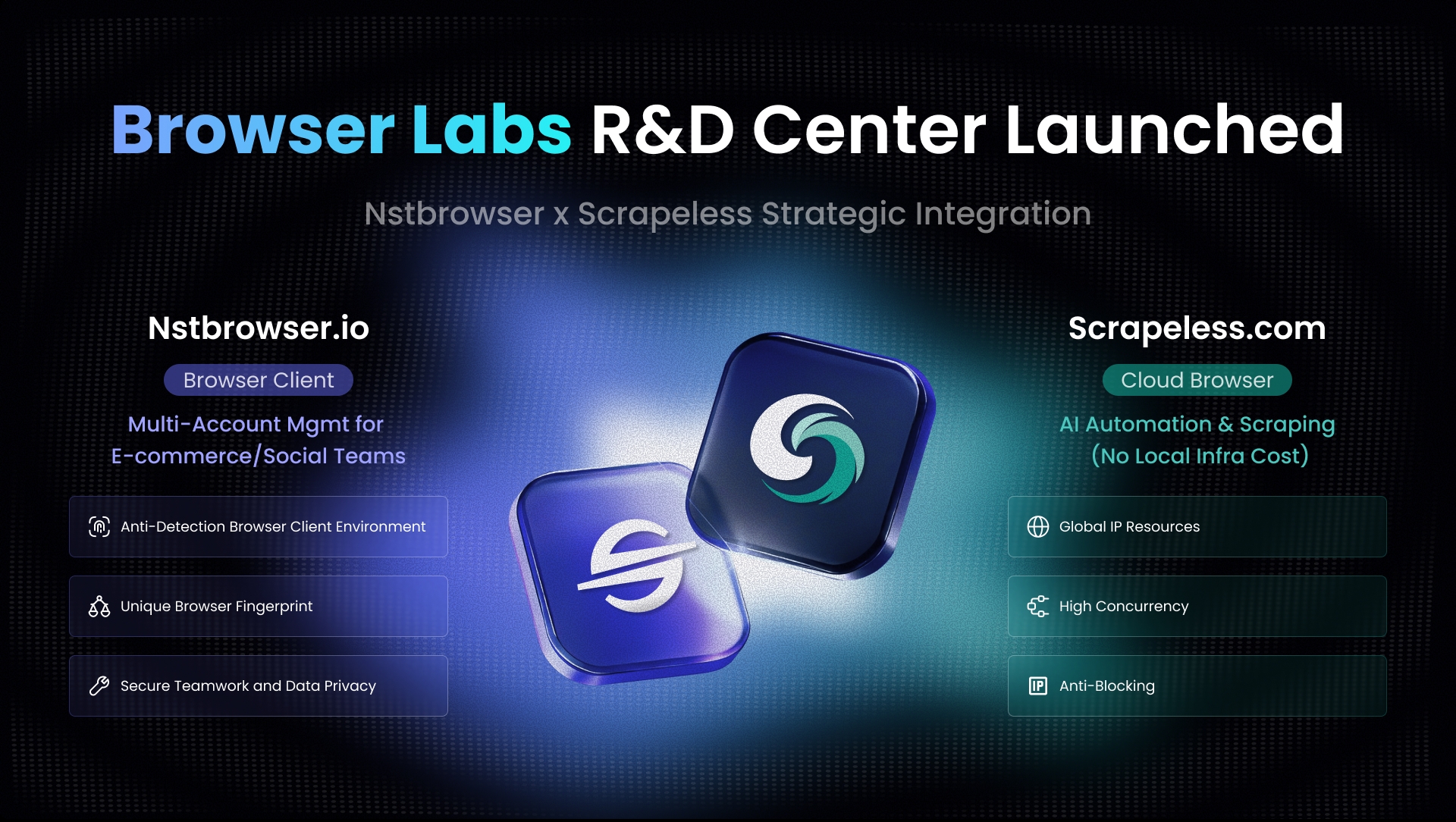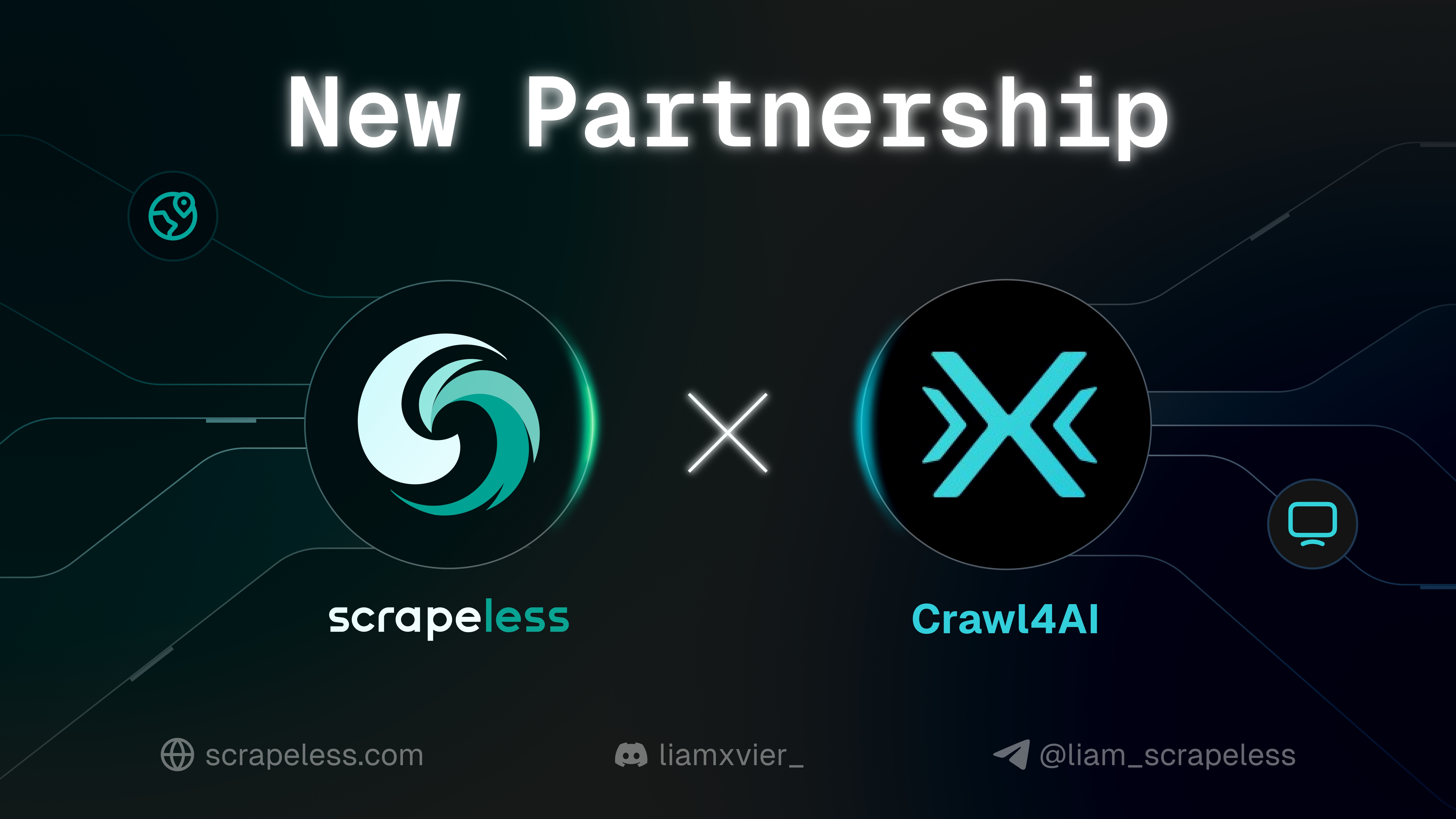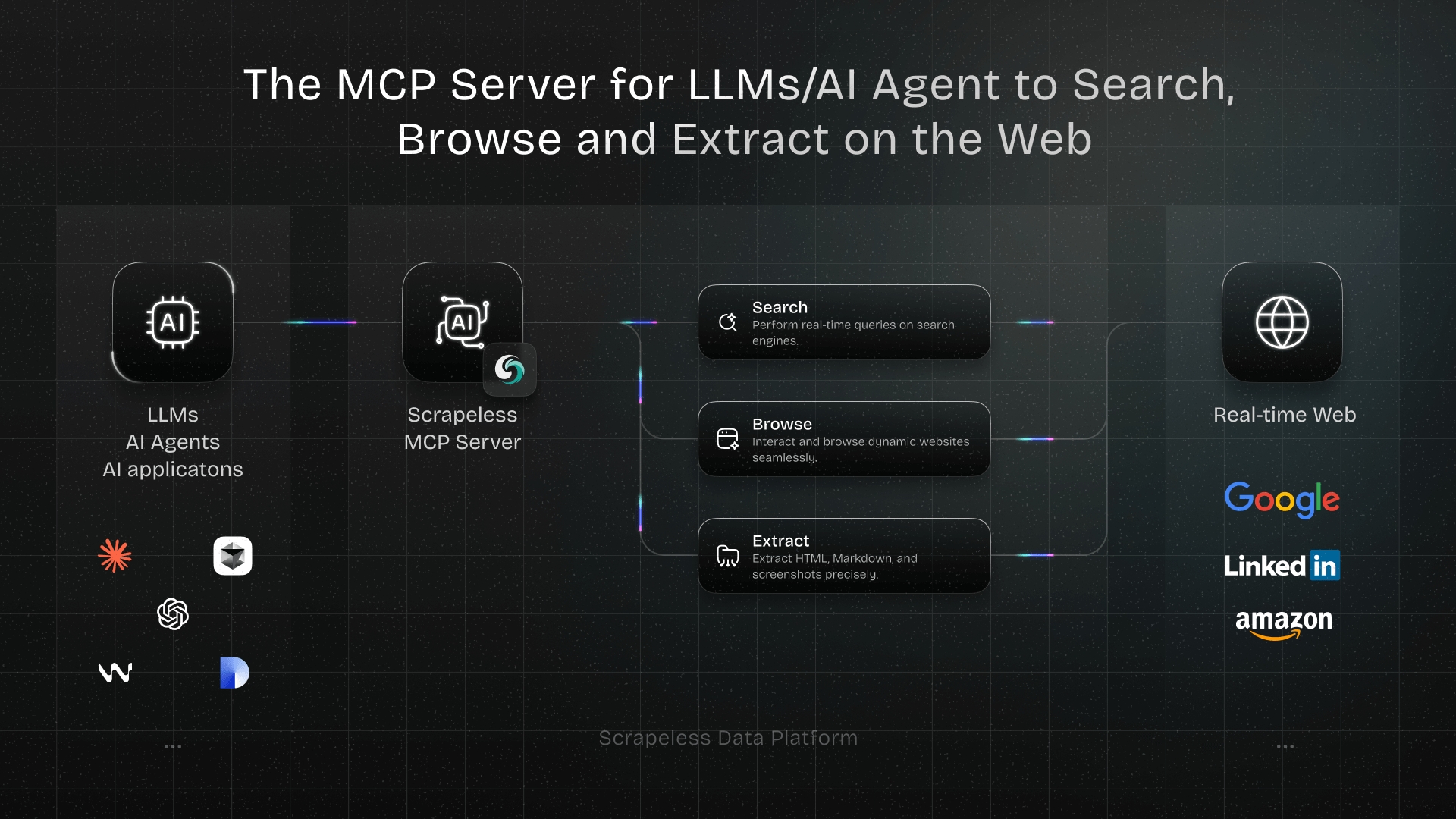Top 10 Free Proxies for Web Scraping (Reviewed in 2025)
Specialist in Anti-Bot Strategies
Key Takeaways
- Free proxies can be a tempting option for web scraping due to their zero cost, but they often come with significant limitations in reliability, speed, and security.
- While some free proxy lists exist, their ephemeral nature and high block rates make them unsuitable for serious or large-scale scraping projects.
- This guide reviews the top 10 free proxy options available in 2025, highlighting their pros, cons, and ideal use cases.
- For robust and scalable web scraping, paid proxy services or managed scraping APIs are generally recommended over free alternatives.
- Scrapeless offers a superior, managed solution for reliable web access, while NSTproxy provides a specialized proxy service for specific needs.
Introduction
Web scraping, the automated extraction of data from websites, is a powerful technique for gathering valuable information across various industries. However, websites often employ sophisticated anti-bot measures to prevent scraping, making it challenging to collect data consistently. Proxies are a crucial tool in overcoming these hurdles, as they allow scrapers to route requests through different IP addresses, thereby masking their origin and avoiding IP bans. While numerous paid proxy services offer high reliability and performance, the allure of "free proxies" often attracts beginners and those with limited budgets. But are free proxies truly viable for web scraping in 2025? This comprehensive guide, "Top 10 Free Proxies for Web Scraping (Reviewed in 2025)," delves into the world of free proxy options, examining their utility, limitations, and the best ways to leverage them (if at all). We will review 10 prominent free proxy sources and discuss their suitability for various scraping tasks. Ultimately, we will demonstrate why, for serious web scraping endeavors, a managed solution like Scrapeless or a specialized provider like NSTproxy offers far greater reliability and efficiency.
The Reality of Free Proxies for Web Scraping
Before diving into specific options, it's crucial to understand the inherent challenges and limitations associated with free proxies. While they might seem like a cost-effective solution, they often come with significant drawbacks that can hinder your scraping efforts [1].
Common Issues with Free Proxies:
- Unreliability: Free proxies are often unstable, with frequent disconnections and high failure rates. They are typically public, overloaded, and poorly maintained.
- Slow Speed: Due to high usage and limited bandwidth, free proxies are notoriously slow, significantly increasing scraping time.
- Security Risks: Many free proxies are operated by unknown entities and can pose security risks, potentially intercepting or modifying your data. They might also inject malware or ads.
- High Block Rate: Websites are quick to identify and block IP addresses from known free proxy lists, rendering them ineffective for sustained scraping.
- Limited Geo-targeting: Free proxies rarely offer specific geo-targeting options, which are essential for accessing region-specific content.
- Lack of Support: There is typically no customer support for free proxy services, leaving users to troubleshoot issues independently.
- Ephemeral Nature: Free proxy lists change constantly, requiring continuous monitoring and updating of your proxy pool.
Despite these challenges, understanding where to find and how to cautiously use free proxies can be beneficial for very small-scale, non-critical projects, or for learning purposes. However, for any serious data extraction, their limitations quickly become apparent.
Top 10 Free Proxy Options for Web Scraping (Reviewed in 2025)
Here's a review of 10 free proxy options, ranging from public lists to services offering limited free tiers. It's important to note that the term "free" often implies significant compromises in quality and reliability.
1. Scrapeless (Recommended for reliable web access)
While not a traditional "free proxy list," Scrapeless offers a free trial that provides access to its robust, managed web scraping API. This is a crucial distinction: instead of just providing raw proxy IPs, Scrapeless handles the entire web access layer, including proxy rotation, anti-bot bypass, and JavaScript rendering. For anyone serious about web scraping, even on a budget, starting with a free trial of a managed service like Scrapeless is far more effective than relying on unstable free proxies [2].
Pros:
- Managed Solution: Handles all complexities of web access (proxies, anti-bot, JS rendering).
- High Reliability: Designed for consistent data extraction with high success rates.
- Scalability: Built for large-scale operations without user management of infrastructure.
- Free Trial: Offers a free tier or trial that provides a taste of reliable scraping.
- Focus on Data: Allows users to focus on data processing rather than infrastructure.
Cons:
- Not "Purely Free" for Long-Term: The free trial has limitations; continued use requires a paid plan.
- Less Granular Control: Users have less direct control over individual proxy IPs.
Best For: Developers and businesses seeking reliable, scalable web scraping without the hassle of managing proxies and anti-bot measures. Ideal for evaluating a professional solution before committing.
2. NSTproxy (Recommended for specialized proxy needs)
NSTproxy is another service that, while primarily paid, often provides free trials or limited free access to its specialized proxy networks. It focuses on high-quality residential and mobile proxies, which are significantly more effective for bypassing sophisticated anti-bot systems than typical datacenter proxies found in free lists. If your scraping targets require high-anonymity and geo-specific IPs, exploring NSTproxy's free offerings can be valuable [3].
Pros:
- High-Quality Proxies: Offers residential and mobile proxies, which are more effective for bypassing blocks.
- Specialized Networks: Good for geo-targeting and high-anonymity scraping.
- Free Trial/Limited Access: Provides opportunities to test their premium services for free.
- Better Performance: Generally more reliable and faster than public free proxies.
Cons:
- Not "Purely Free" for Long-Term: Similar to Scrapeless, free access is usually limited.
- Requires Configuration: Users need to configure their scrapers to use the proxies.
Best For: Users needing to test high-quality residential or mobile proxies for specific, challenging scraping tasks, or those looking for a more robust solution than public free lists.
3. Free Proxy List (freeproxylist.net)
This is one of the many websites that aggregate public proxy lists. It typically provides a large number of HTTP, HTTPS, and SOCKS proxies, often categorized by country, speed, and anonymity level. The list is updated frequently, but the quality of individual proxies can vary wildly [4].
Pros:
- Large Quantity: Access to thousands of free proxies.
- Variety: Offers different proxy types (HTTP, HTTPS, SOCKS).
- Frequent Updates: Lists are refreshed regularly.
Cons:
- Very Unreliable: High percentage of dead or extremely slow proxies.
- Low Anonymity: Many proxies are transparent or anonymous, not elite.
- Security Risks: Public proxies are inherently less secure.
- High Block Rate: IPs are often blacklisted by target websites.
Best For: Very casual, small-scale scraping for non-sensitive data, or for learning purposes where reliability is not a concern.
4. ProxyScrape (proxyscrape.com)
ProxyScrape is another popular platform that provides free proxy lists, including HTTP, SOCKS4, and SOCKS5 proxies. It allows users to filter proxies by anonymity level, country, and uptime. They also offer a premium service, but their free list is widely used [5].
Pros:
- Filter Options: Allows filtering by type, anonymity, and country.
- Regularly Updated: The free list is updated frequently.
- Simple Interface: Easy to download proxy lists.
Cons:
- Similar Issues to Other Free Lists: High unreliability, slow speeds, and security concerns.
- Limited Longevity: Proxies on the free list tend to die quickly.
- Frequent Blocks: IPs are easily detected and blocked by sophisticated websites.
Best For: Quick, one-off scraping tasks where data integrity and speed are not critical, or for testing basic proxy integration.
5. Free Proxy World (freeproxy.world)
Free Proxy World offers daily updated lists of free HTTP, HTTPS, and SOCKS proxies. It provides basic information like country, speed, and uptime. Like other public lists, its primary appeal is the sheer volume of available IPs [6].
Pros:
- Daily Updates: Ensures a fresh supply of proxies.
- Categorization: Proxies are categorized for easier selection.
- No Registration: Accessible without any signup.
Cons:
- Low Quality: Many proxies are non-functional or very slow.
- Security Concerns: Standard risks associated with public proxies.
- Ineffective for Anti-Bot: IPs are easily identified and blocked by advanced anti-scraping systems.
Best For: Experimental scraping, or when you need a very large, disposable pool of IPs for non-critical tasks.
6. Spys.one
Spys.one is a long-standing free proxy provider that offers an extensive list of proxies with detailed information, including uptime, response time, and anonymity level. It's known for its comprehensive filtering options, allowing users to find proxies based on various criteria [7].
Pros:
- Detailed Information: Provides more data points for each proxy than many other lists.
- Advanced Filtering: Allows granular selection of proxies.
- Large Database: A vast number of proxies are listed.
Cons:
- Overwhelming Interface: The website can be cluttered and difficult to navigate for new users.
- Variable Quality: Despite detailed info, many proxies are still unreliable.
- Manual Effort: Requires significant manual effort to test and filter working proxies.
Best For: Users who are willing to invest time in manually sifting through lists to find potentially working proxies for specific, short-term needs.
7. Geonode (Free Trial)
Geonode is a premium proxy provider that offers a free trial, allowing users to test their high-quality residential and datacenter proxies. While not a perpetually free service, its free trial provides a valuable opportunity to experience reliable proxy performance without initial cost. This is a better alternative for serious testing than public lists [8].
Pros:
- High-Quality Proxies: Access to premium residential and datacenter proxies during the trial.
- Reliable Performance: Much faster and more stable than public free proxies.
- Good for Testing: Excellent for evaluating a professional service.
Cons:
- Limited Duration/Usage: The free trial is temporary and has usage limits.
- Requires Registration: Typically requires signing up for an account.
Best For: Users who need to test the performance of premium proxies for a limited time, or those planning to eventually invest in a paid service.
8. Webshare (Free Plan)
Webshare offers a permanent free plan that includes 10 datacenter proxies with a monthly bandwidth limit (e.g., 1GB). While the number of proxies and bandwidth are limited, these proxies are generally more stable and reliable than those found on public lists. It's a good option for very small, consistent scraping tasks [9].
Pros:
- Permanent Free Plan: Offers a consistent set of 10 proxies.
- Relatively Stable: More reliable than random public proxies.
- Easy to Use: Simple setup and integration.
Cons:
- Very Limited: Only 10 proxies and low bandwidth limit.
- Datacenter Proxies: Less effective against advanced anti-bot measures than residential proxies.
- Requires Registration: Account creation is necessary.
Best For: Very small-scale, consistent scraping tasks where the target website has minimal anti-bot protection, or for learning basic proxy integration.
9. Free-Proxy.cz
Free-Proxy.cz is another aggregator of free public proxies, offering HTTP, HTTPS, SOCKS4, and SOCKS5 options. It provides basic filtering capabilities and updates its lists regularly. Similar to other public lists, its utility is primarily for quick, non-critical tasks [10].
Pros:
- Variety of Proxies: Offers different types and protocols.
- Regular Updates: Keeps the list relatively fresh.
- Simple Access: Easy to copy proxy details.
Cons:
- High Unreliability: Many proxies are dead or slow.
- Security Concerns: Standard risks associated with public, unknown proxies.
- Poor Performance: Not suitable for speed-sensitive or large-scale scraping.
Best For: Ad-hoc scraping needs, testing proxy functionality, or educational purposes where the risk of failure is acceptable.
10. HideMy.name (Free Proxy List)
HideMy.name is primarily a VPN service, but they also offer a free proxy list on their website. This list includes HTTP, HTTPS, and SOCKS proxies with details on speed, uptime, and country. Their proxies are often checked for functionality, offering a slightly better chance of finding working IPs compared to completely unmanaged lists [11].
Pros:
- Checked Proxies: Some level of verification for proxy functionality.
- Detailed Info: Provides useful metrics like speed and uptime.
- Variety: Offers different proxy types.
Cons:
- Limited Quantity: The free list is not as extensive as some dedicated aggregators.
- Still Unreliable: While checked, public proxies remain inherently unstable.
- Security Risks: Public proxies carry inherent security vulnerabilities.
Best For: Users looking for a slightly more curated free proxy list, perhaps for short-term, non-critical scraping tasks.
Comparison Summary: Free Proxy Options
| Feature / Aspect | Scrapeless (Trial) | NSTproxy (Trial) | Free Proxy List (e.g., freeproxylist.net) | ProxyScrape (Free List) | Webshare (Free Plan) |
|---|---|---|---|---|---|
| Type | Managed API | Specialized Proxy Service | Public Proxy List | Public Proxy List | Datacenter Proxy (Limited) |
| Reliability | High | High | Very Low | Low | Medium |
| Speed | High | High | Very Low | Low | Medium |
| Security | High (managed) | High (managed) | Very Low (unknown operators) | Low (public) | Medium (managed by provider) |
| Anti-Bot Bypass | Excellent (built-in) | Excellent (residential/mobile) | Very Poor | Poor | Poor (datacenter IPs) |
| JavaScript Rendering | Yes (built-in) | No (proxy only) | No (proxy only) | No (proxy only) | No (proxy only) |
| Scalability | High (managed) | High (paid plans) | Very Low (manual effort) | Low (manual effort) | Very Low (limited IPs/bandwidth) |
| Cost | Free Trial (then paid) | Free Trial (then paid) | Free (but high hidden costs) | Free (but high hidden costs) | Free (limited) |
| Ideal Use Case | Reliable, scalable, complex scraping | High-anonymity, geo-specific scraping | Learning, very small non-critical tasks | Quick tests, basic proxy integration | Very small, consistent tasks |
Why Free Proxies Are Not a Sustainable Solution for Serious Web Scraping
While the concept of free proxies is appealing, the reality for serious web scraping is often disappointing. The high unreliability, slow speeds, security risks, and constant battle against IP blocks make them inefficient and often counterproductive for any project beyond basic experimentation. A study by [Proxyway in 2023] (https://proxyway.com/blog/free-proxies-for-web-scraping) found that the success rate of free proxies for web scraping is often below 10%, with many being dead or extremely slow. This means that the time and effort spent managing and troubleshooting free proxies often outweigh any perceived cost savings.
For professional or large-scale web scraping, investing in a reliable proxy solution is not an expense, but a necessity. The cost of failed requests, wasted time, and potential data inaccuracies far exceeds the cost of a quality paid service. This is where managed solutions like Scrapeless truly shine.
Why Scrapeless is Your Essential Partner for Web Scraping
In the challenging landscape of web scraping, where websites are constantly evolving their anti-bot defenses, relying on free proxies is akin to bringing a knife to a gunfight. While individual tools like Scrapy or Playwright provide the scraping logic, they still need a robust infrastructure to consistently access web content. This is precisely where Scrapeless steps in as your essential partner.
Scrapeless is not just a proxy provider; it's a comprehensive, managed web scraping API that handles all the underlying complexities of web access. It acts as an intelligent layer between your scraper and the target website, ensuring reliable data delivery. By integrating Scrapeless, you gain:
- Guaranteed Access: Scrapeless automatically manages a vast pool of rotating residential and datacenter proxies, intelligently bypassing advanced anti-bot systems, CAPTCHAs, and IP blocks. This means your requests consistently reach the target, maximizing your success rate.
- Full JavaScript Rendering: For dynamic, JavaScript-heavy websites, Scrapeless renders pages completely, providing you with the final, fully loaded HTML content. This eliminates the need for you to manage headless browsers or complex rendering logic.
- Scalability Without Overhead: Forget about managing proxy pools, maintaining headless browser farms, or dealing with server infrastructure. Scrapeless scales automatically to meet your demands, allowing you to focus on data utilization and analysis rather than infrastructure management.
- Simplified Workflow: Integrate with a single API call, reducing development time and maintenance efforts. This means you can use your preferred parsing logic (e.g., with BeautifulSoup, Scrapy, or Playwright) while Scrapeless ensures reliable data delivery.
- Cost-Efficiency: Pay only for successful requests, optimizing your budget and avoiding wasted resources on blocked attempts. This makes it a more predictable and often more cost-effective solution than constantly battling with free proxies.
By leveraging Scrapeless, you transform your web scraping projects from a constant battle against website defenses into a streamlined, efficient, and highly reliable data acquisition pipeline. It allows developers to harness the power of their chosen tools without being bogged down by the complexities of web access, and empowers businesses to achieve robust scraping results with minimal effort.
Conclusion and Call to Action
The quest for free proxies in web scraping often leads to frustration, unreliability, and ultimately, wasted time. While a few limited free options exist for very small-scale or experimental tasks, they are fundamentally unsustainable for serious data extraction in 2025. The evolving landscape of anti-bot technologies demands a more robust and intelligent approach.
This review has highlighted the critical shortcomings of relying solely on free proxies and underscored the necessity of reliable infrastructure for successful web scraping. For consistent, scalable, and hassle-free data acquisition, managed solutions like Scrapeless offer a far superior alternative. By abstracting away the complexities of proxy management, anti-bot bypass, and JavaScript rendering, Scrapeless empowers you to focus on what truly matters: extracting valuable data and deriving insights.
Ready to move beyond the limitations of free proxies and achieve reliable web scraping results?
Explore Scrapeless's advanced web scraping API and elevate your data extraction projects today!
FAQ (Frequently Asked Questions)
Q1: Why are free proxies generally not recommended for web scraping?
A1: Free proxies are typically unreliable, slow, and insecure. They have high block rates, offer poor anonymity, and often lack the necessary features (like JavaScript rendering or advanced anti-bot bypass) required for effective scraping of modern websites. For any serious project, the time and effort spent managing them usually outweigh the cost savings.
Q2: What is the difference between a free proxy list and a free trial from a proxy service?
A2: A free proxy list provides a collection of public, often unmanaged, IP addresses that are usually unstable and easily blocked. A free trial from a reputable proxy service (like Scrapeless or NSTproxy) offers limited access to their premium, managed proxy networks, which are designed for reliability, speed, and bypassing anti-bot measures. The latter is a much better option for testing professional-grade solutions.
Q3: Can free proxies be used for large-scale web scraping?
A3: No, free proxies are generally unsuitable for large-scale web scraping. Their inherent unreliability, slow speeds, and high block rates make it impossible to maintain consistent data flow and achieve significant volumes. Large-scale scraping requires robust, rotating proxy networks and advanced anti-bot solutions, typically found in paid services.
Q4: Are there any security risks associated with using free proxies?
A4: Yes, significant security risks exist. Many free proxies are operated by unknown entities and could potentially intercept your data, inject malware, or monitor your online activity. It's highly advisable to avoid using free proxies for sensitive data or when security is a concern.
Q5: How can Scrapeless help if I'm currently using free proxies?
A5: Scrapeless can replace the need for managing free proxies entirely. It provides a managed API that handles all aspects of web access, including proxy rotation, anti-bot bypass, and JavaScript rendering. This means you can send your scraping requests to Scrapeless and receive clean, reliable data, freeing you from the frustrations and limitations of free proxies.
References
[1] Proxyway: Free Proxies for Web Scraping: Proxyway Free Proxies
[2] Scrapeless: Universal Scraping API: Scrapeless Universal API
[3] NSTproxy: Residential Proxies: NSTproxy Residential Proxies
At Scrapeless, we only access publicly available data while strictly complying with applicable laws, regulations, and website privacy policies. The content in this blog is for demonstration purposes only and does not involve any illegal or infringing activities. We make no guarantees and disclaim all liability for the use of information from this blog or third-party links. Before engaging in any scraping activities, consult your legal advisor and review the target website's terms of service or obtain the necessary permissions.



